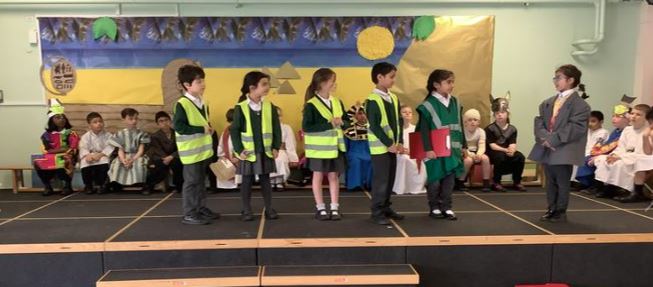Deanesfield Primary School in Ruislip has achieved the Inclusive School Award with Flagship status.
Very Popular School
Deanesfield Primary School is a three form entry school in the London Borough of Hillingdon near its boundary with the more socially deprived areas of Ealing and Harrow. Pupils attend from all three boroughs. Currently there are 674 pupils on roll but this will increase in January when more children start at the Nursery. EAL pupils are at 40%, PP at 19% and children with Education, Health and Care Plans (EHCP) are at 2.1%. 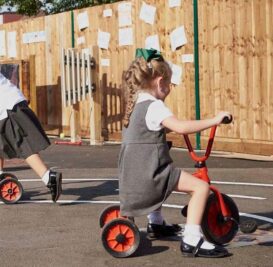
The school has Specialist Resource Provision (SRP) for eight children with speech and communication needs and all these children are fully integrated with their peers. Some pupils who are waiting for specialist provision are being supported out of class, in the After School building, as they are finding it increasingly hard to access the curriculum.
Specific adaptations for pupil with complex needs are put in place to support pupils waiting for more specialist placements.
The school is very popular locally. Whilst other schools are seeing falling rolls in the under-fives, Deanesfield is full, with waiting lists, as some families move out of the area to be closer to grammar schools whilst other families move locally to more affluent areas and others move long distances away, where housing is cheaper. Deanesfield is a Gold Standard Rights Respecting school.
Support for Families
Support for families and transition was very evident on the day of our Assessor’s visit as there was a welcome meeting for families whose children will be starting Nursery in January. As well as this meeting, the school makes home visits and contact with any other settings where the child might be and, in December, will be offering Stay and Play, Storytime and Come and Play sessions. The whole aim is to start to build strong relationships with parents and to get to know the children. This allows for planning for any additional support that is needed.
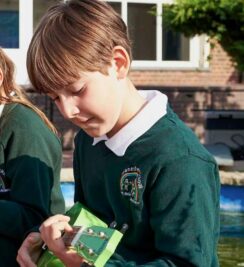 As it is recognised that many of the children need support for language development, there is a space where a new nursery rhyme is displayed each week so that the children can be exposed to a range of language. For example, the previous week’s rhyme had the word ‘spout’ that many children would not have come across.
As it is recognised that many of the children need support for language development, there is a space where a new nursery rhyme is displayed each week so that the children can be exposed to a range of language. For example, the previous week’s rhyme had the word ‘spout’ that many children would not have come across.
In addition, there is a Box Clever area which again is used to expand and develop vocabulary. When our Assessor visited, ‘houses’ was the theme. Communication and interaction are major themes as is the development of fine motor skills. The children were happily engaged in activities inside and outside the building and free flow is in place. The play area outside is spacious and has a range of equipment and activities to promote physical development.
The pupils were happily engaged in the Reception areas. The wall displays are interactive and one, for example, was for phonics and you could see how sounds had been added as they were introduced to the pupils. Key words are displayed as well in order to support the children.
There are specialist areas like one for investigation as well as book corners and our Assessor saw one pupil, working with an adult, accessing phonics online. The aim is to tailor the support for individual need. There are three Reception classrooms but the doors are open and pupils can move between them if they need to.
There is some more formal whole class teaching and one class visited was sitting on the mat, engaging with Maths. Here they were learning to ‘add on’ numbers. They were watching and listening and using manipulatives to ‘add on’ one. Individual support was evident as one pupil was working at a table but then chose to move to the carpet with the others.
Plans and Strategies
In the Year 1 corridor, there is a gradual move from the Early Years Foundation Stage (EYFS) curriculum to that of Key Stage 1. Tables, for example, are gradually added to the room so that pupils can have a slow move from Reception teaching to a more formal setting. This gradual addition is another example of targeted support. It allows the pupils to settle in what they know, yet supports the moving on that they need. There are the same interactive walls in all the Key Stage 1 classrooms so that learning can be seen developing. Children with more complex needs in Key Stage 1 are supported by the Inclusion Team and plans and strategies are shared. 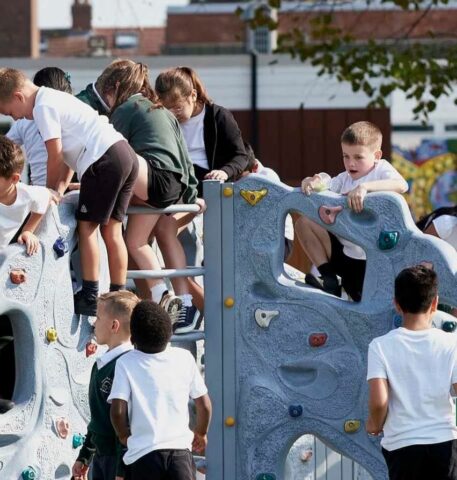
The Key Stage 2 classrooms also have the interactive walls. Our Assessor saw a teacher writing vocabulary on ‘stick its’ which were then put on the display. The pupils could take them, use them for their writing and return. Each classroom also has a charter which is individualised for each class. The corridor displays highlight mental health and wellbeing and each has the appropriate individual right. Pupil artwork in displays is also a highlight throughout the school.
The school benefits from several subject-specific rooms: a computer suite, sports hall, cookery room, music room and a library, to name but a few. These rooms support the curriculum and the desire to offer as much extension as possible to support the development of the pupils.
Swimming takes place for the targeted year group every day for two weeks. This helps to build confidence. All children are included. An example of this is the school working with the parent and the swimming pool to enable a visually impaired pupil to swim wearing her glasses. Parents who know that their child might find the swimming pool environment stressful often take their child to visit first.
Individualised Response
The use of Google Classroom has expanded. All children have a Chromebook and our Assessor saw these in use in the classrooms. Teachers post work on them and so there are no paper worksheets unless specifically required.
The pupils are often encouraged to work together as well as using them as a resource to either extend or support their learning. Homework is posted on Google Classroom and the school will lend PP pupils Chromebooks for home, if needed.
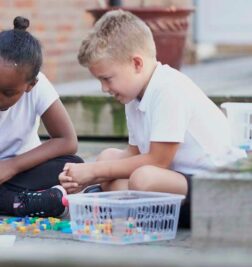 Staff like the way in which the use of Chromebooks has reduced their workload and how it supports adaptive practices. Pupils like how they can privately message the teacher about issues with work and how they know the response is individualised for them.
Staff like the way in which the use of Chromebooks has reduced their workload and how it supports adaptive practices. Pupils like how they can privately message the teacher about issues with work and how they know the response is individualised for them.
Outside of the school, there are further opportunities for the pupils to develop and challenge themselves. The large area means that year groups can be allotted their own space with a range of activities. There is a blue path around the field for the Daily Mile and there is a large stopwatch that pupils can use if they want to improve their time while others can just walk and talk if that is best for them.
There is a biodome that the classes can use to investigate plants and how they grow, a forest-type area outside with a dipping pond and cameras are there so that pupils can watch foxes and other wildlife as they use the space. Inside, a quadrangle space is paved with seating and tables and has a small pond. This is a space where individuals can have some time out as well as learning opportunities for classes and small groups. The latest edition is a large, open tent space.
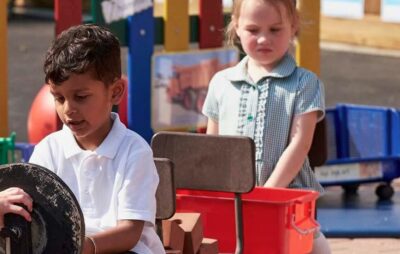 The staff are fully engaged with the inclusion agenda. Additional SEND teachers have been employed since September. They offer staff support with strategies and work adaptation as well as supporting pupils in and out of class. Staff appreciate this extra level of support and acknowledge how their own development and wellbeing is supported.
The staff are fully engaged with the inclusion agenda. Additional SEND teachers have been employed since September. They offer staff support with strategies and work adaptation as well as supporting pupils in and out of class. Staff appreciate this extra level of support and acknowledge how their own development and wellbeing is supported.
There are regular Continuing Professional Development (CPD) opportunities and since they have a generous amount of Planning, Preparation and Assessment (PPA) time, some of this is spent supporting colleagues in other classrooms which helps develop their own practice and other PPA time can be done at home.
There is a real team feeling about the staff. There was clear evidence of this as the Inclusion Lead was unwell but the Headteacher, Deputy Headteacher and staff were prepared to step in to support the assessment day.
Pupils are Articulate
The pupils are articulate and keen to engage with adults and each other. One told our Assessor that the best thing about the school was, “we learn that everyone is different and really special”. They see that it is important that no one is left out and how there is always support available.
They like the access they have to activities in school, school trips and the clubs that are available to them as well as the importance of them raising money to support charities. All of Year 6 belong to the School Council and there are School Council representatives for each class who feedback to the Council.
Pupil voice is strong and is encouraged in the school. Pupils explained that they feel safe and happy. Much thought is given to the best way to support pupils. For example, a Play Therapist is in one day a week and when the Speech and Language Therapist meets with children in school, a Teaching Assistant (TA) is there so that the intervention can take place in classrooms as well. Reduced timetables are used to support a build up to a full school day for those pupils who may need it. 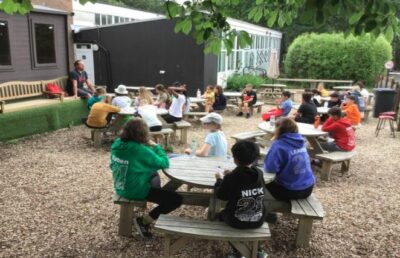
Parents are also very happy with the school. From the recent questionnaire, parents are overwhelmingly in support of the school’s work.
One parent explained that she appreciated the consistency of response shown by staff across the school and that the same values are shared by all.
She praised the work the school is doing on Growth Mindset and how that had helped her child and that everything is always about the child.
Find out more about the IQM Inclusive School Award
If your school is interested in obtaining the IQM Inclusive School Award or you wish to talk to a member of the IQM team please telephone:
028 7127 7857 (9.00 am to 5.00 pm)
or email: [email protected] for further details.
Want more information on the IQM Award? Click here to request your free IQM information pack.
